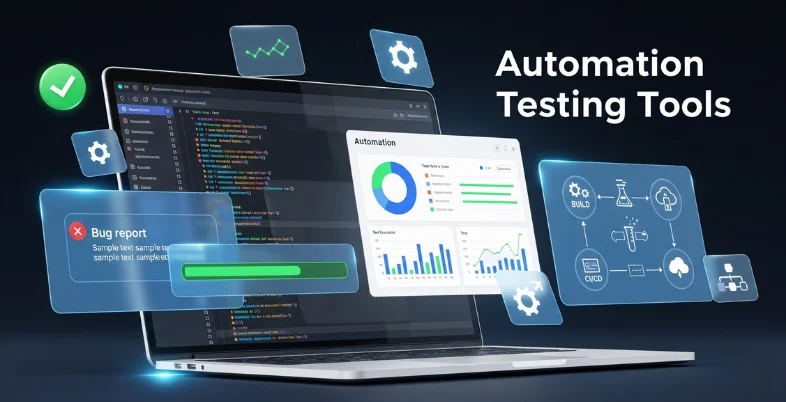In today’s fast-moving software world, testing isn’t just about finding bugs-it’s about trust, reliability, and user confidence. Think of automation testing as a safety net: it protects your product’s reputation, ensures seamless experiences, and keeps pace with rapid releases. But doing it manually? Slow, error-prone, and unsustainable. That’s where automation testing tools come in-your shortcut to speed, accuracy, and scalability.
Here’s the twist: not every tool is built the same. Some focus on web apps, others shine in mobile, APIs, or enterprise systems. The best ones simplify workflows while integrating into modern DevOps pipelines.
As engineering teams scale, many now rely on automated testing for faster delivery to keep up with rapid release cycles while maintaining stability.
So why does this matter? Because the right automation testing tool isn’t just software-it’s your silent partner in delivering quality, efficiency, and competitive edge.
Why Automation Testing Matters
In this current high-speed development environment of software testing, automated software testing services and automation testing tools are necessary as they guarantee accuracy, efficiency, and speed that is not always possible with manual testing on a large scale. Using automation to test repetitive and time-consuming cases, teams save a significant amount of time, as well as minimize human error.
It enables continuous integration and continuous delivery (CI/CD), allowing developers to identify problems at an early stage of development and release faster. Automation also enhances coverage to various browsers, devices, and platforms to provide consistent user experiences.
Being able to execute multiple functions simultaneously, self-heal, and reuse scripts, AI-based automation testing increases productivity and reduces long-term costs. Finally, it enables organisations to have high-quality software and remain competitive in the rapidly growing digital ecosystem.
Key Benefits of Automation Testing
- Quick Execution- Automation testing tools help greatly decrease the amount of time spent on testing by executing known test scenarios rapidly and allowing parallel execution, as well as allowing continuous delivery without halting development or postponing product releases.
- Enhanced Accuracy- Automation removes human error in routine processes to achieve consistent, accurate, and reliable test results. This increases the confidence in the quality of the software and minimises the costly post-release defects.
- Better Test Coverage- Automation increases test coverage to be executed on a variety of platforms, browsers, devices, and configurations at the same time to ensure that features, performance, and user experiences are fully validated at scale.
- Cost Efficiency- Automation can save on costs in the long run by cutting the costs of manual labor, lessening the number of regression tests run, and enabling shorter delivery times, resulting in fewer quality-related failures.
- Early Bug Detection- CI/CD pipelines Integration will allow automatic tests to be run immediately, detecting bugs at an early stage in the development cycle. This helps avoid the compounding of defects and minimizes development efforts by the development teams.
- Script Reusability- Scripts allow the reuse of scripts across versions and across projects, which saves time on developing new cases. This flexibility allows agile settings and increases the speed of verification in iterative development cycles.
- Scalability and Flexibility- Test automation frameworks enable easy scaling of tests in terms of environments, data sets, and devices. The suites of tests can be dynamically adjusted by the teams to the evolving business needs with high efficiency.
- Improved Resource Usage- The automation of repetitive work can reduce the testers to exploratory and strategic testing. This increases the level of innovation, the collaboration with developers increases, and the quality of software is guaranteed with the use of fewer resources.
List of Top 15 Automation Testing Tools
1. Selenium
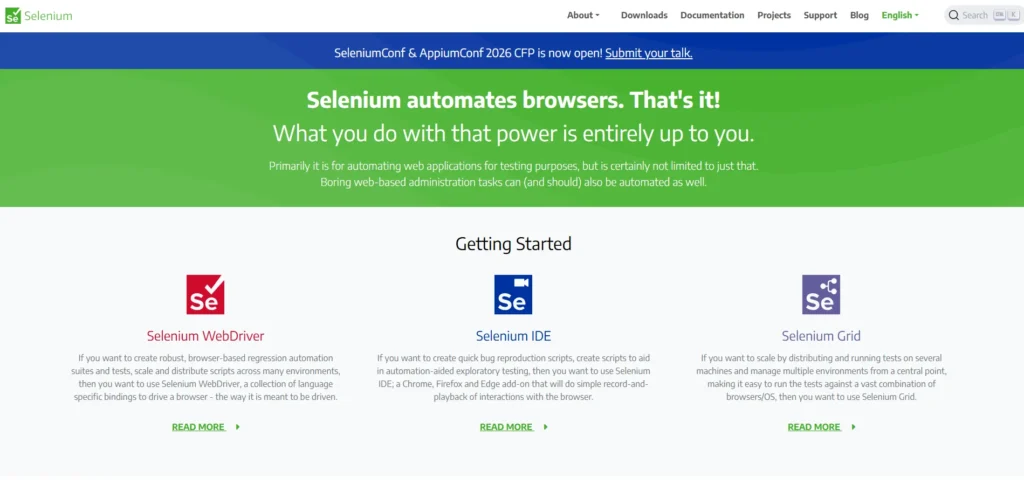
Selenium is an open-source automation test framework that is generally used in web applications on various browsers and sites. It is compatible with several programming languages, which include Java, Python, C#, and JavaScript; thus, it becomes adaptable to diverse development teams.
Using its WebDriver component, Selenium can automate browsers with high efficiency, whereas Grid permits running tests in parallel. Selenium is very flexible, fits in the CI/CD pipeline, and enjoys a robust community.
This renders it one of the preferred options by sites that intend to automate their tests in an agile and DevOps set-up in a scaled and robust manner.
Website: https://www.selenium.dev/
Key Features:
- Cross-browser automation with WebDriver.
- Supports multiple programming languages.
- Selenium Grid for parallel testing.
- Extensive integration with CI/CD tools.
- Large community with strong library support.
2. Playwright
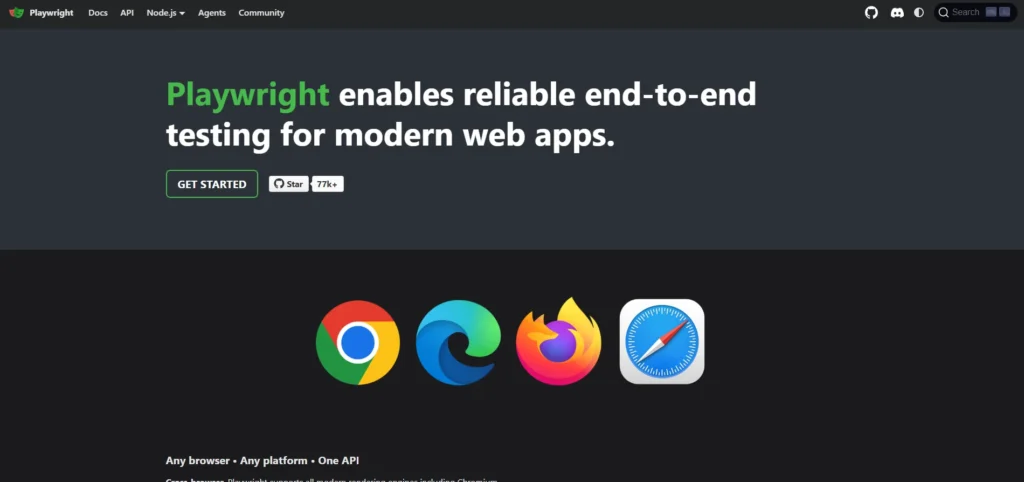
Playwright is a cross-browser and fast automation framework created by Microsoft as an open-source framework to deliver a reliable and fast framework. It also supports Chromium, Firefox, and WebKit using a single API, hence suitable for checking multi-browser compatibility.
Playwright will automatically wait, intercept network requests, and provide headless execution. Developers have more control over it since it can test modern applications with rich UIs, mobile emulation, and powerful debugging capabilities.
The agile teams prefer to use Playwright to test the web applications quickly, reliably, and with high efficiency because of its easy integration into CI/CD pipelines and solid TypeScript/JavaScript support.
Website: https://playwright.dev/
Key Features:
- Cross-browser support (Chromium, Firefox, WebKit).
- Auto-waiting & smart element handling.
- Network interception & mocking.
- Mobile device emulation.
- Seamless CI/CD pipeline integration.
3. Cypress
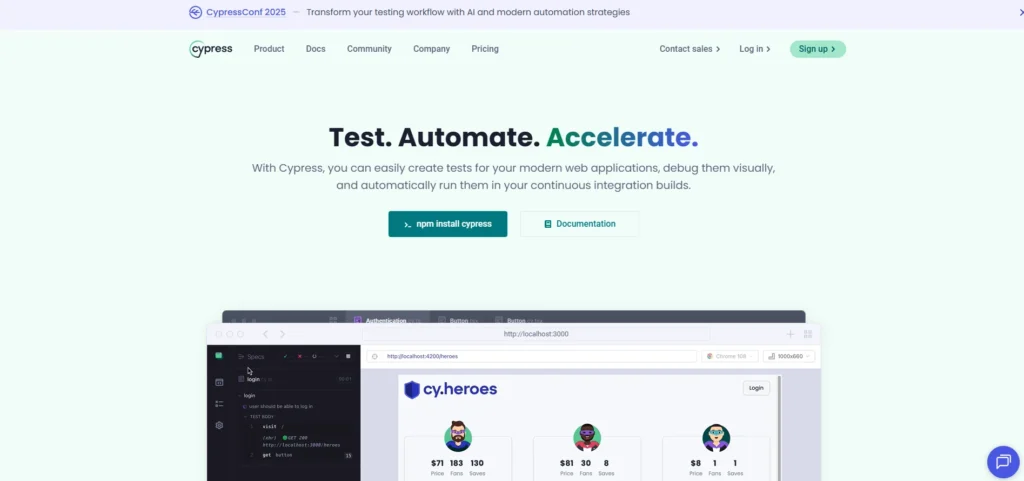
Cypress is an end-to-end testing framework that is developer-friendly and suited to the requirements of modern web applications. As a powerful test automation software, Cypress runs directly in the browser, unlike conventional Selenium-based tools, which execute faster and reload in real-time.
Front-end developers will be pleased because it has time-travel debugging, automatically waits, and rich error messages. Cypress is an interactive dashboard with built-in assertions, therefore, simplifying the process of writing and maintaining tests.
It is supported by JavaScript, and it is easy to combine it with commonly used frameworks such as React, Angular, and Vue, which makes it extremely popular among agile development teams who require speed, reliability, and insights during test automation.
Website: https://www.cypress.io/
Key Features:
- Fast in-browser execution with time-travel.
- Automatic waits for DOM rendering.
- Interactive dashboard & real-time reloads.
- Easy integration with frontend frameworks.
- Detailed error reporting & debugging tools.
Pricing:
- Team– $75/ month
- Business– $300/ month
4. Appium
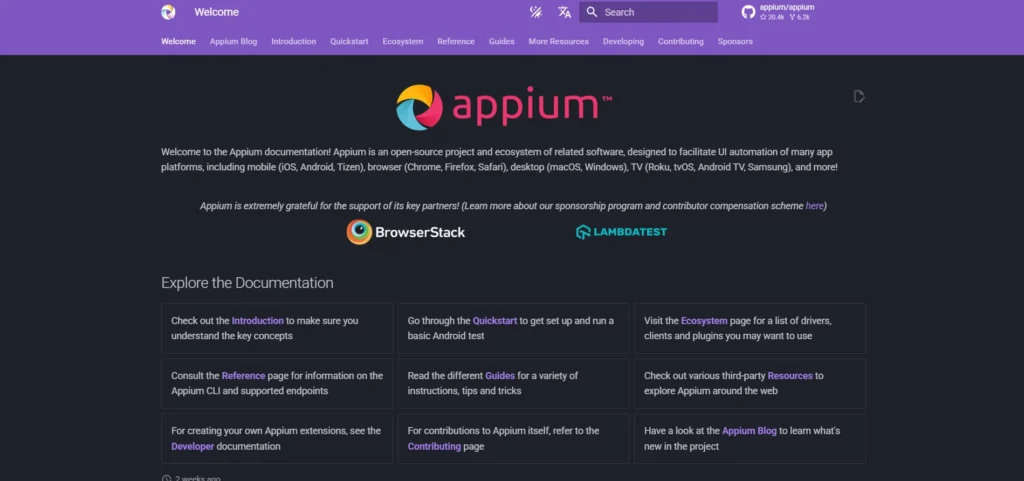
Appium is an open-source automation test tool that is used to test native, hybrid, and mobile web applications on Android and iOS platforms. It is based on a client-server architecture and has a wide range of programming languages (Java, Python, Ruby, and JavaScript) that render it highly adaptable to various teams.
Appium is based on the WebDriver protocol, which provides compatibility with existing Selenium libraries. The tool can be used to perform cross-platform testing, avoiding the maintenance of two different codebases between iOS and Android.
Among the many automation testing tools available today, Appium is popularly used in test automation of mobile applications within agile and DevOps, with high integration with CI/CD pipelines as a result of strong community support.
Website: https://appium.io/docs/en/latest/
Key Features:
- Cross-platform testing (Android & iOS).
- Supports multiple programming languages.
- Uses Selenium WebDriver protocol.
- Native, hybrid & mobile web testing.
- CI/CD integration support.
5. Katalon Platform
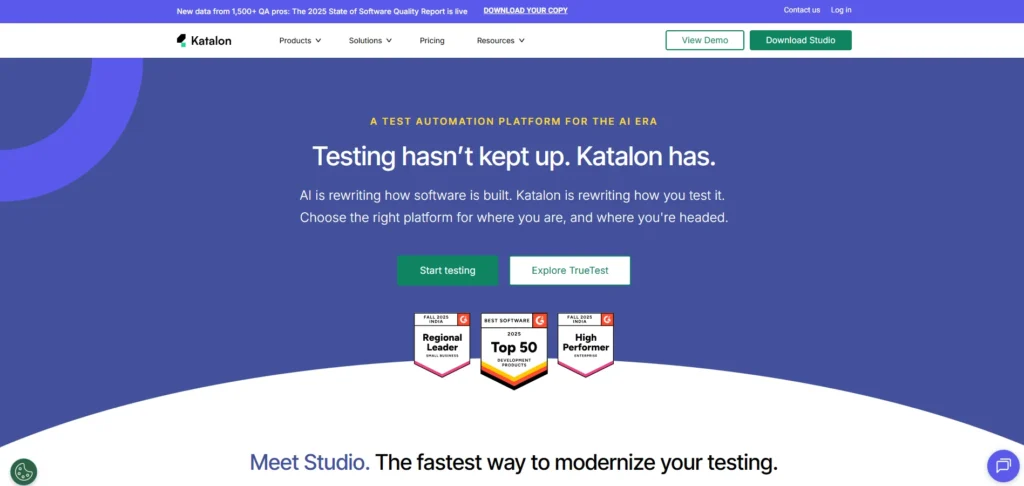
Katalon is a universal automation framework that is used to test web, mobile, and API applications as well as desktop apps. It is also friendly to both technical testers and non-coders with a codeless recorder and scripting support of Groovy/Java, making it one of the leading no-code automation platforms in the market.
Katalon can support the automation of enterprises with pre-integrated CI/CD, Jira, Git, and test management system integrations. It provides the use of reusable test objects, advanced reporting, and self-healing tests with the use of AI that cuts the maintenance costs.
Its capability to operate on-premises and on the cloud allows it to be a powerful tool in the hands of teams that need to consolidate automation efforts without having to invest in several tools.
Website: https://katalon.com/
Key Features:
- Multi-platform testing (web, mobile, API, desktop).
- Codeless recorder + scripting flexibility.
- AI-powered self-healing tests.
- Integrations with CI/CD & ALM tools.
- Reusable test objects & advanced reporting.
Pricing:
- Create– $84 per user/month with annual plan
- Expand– $168 per user/month with annual plan
6. Tricentis Tosca
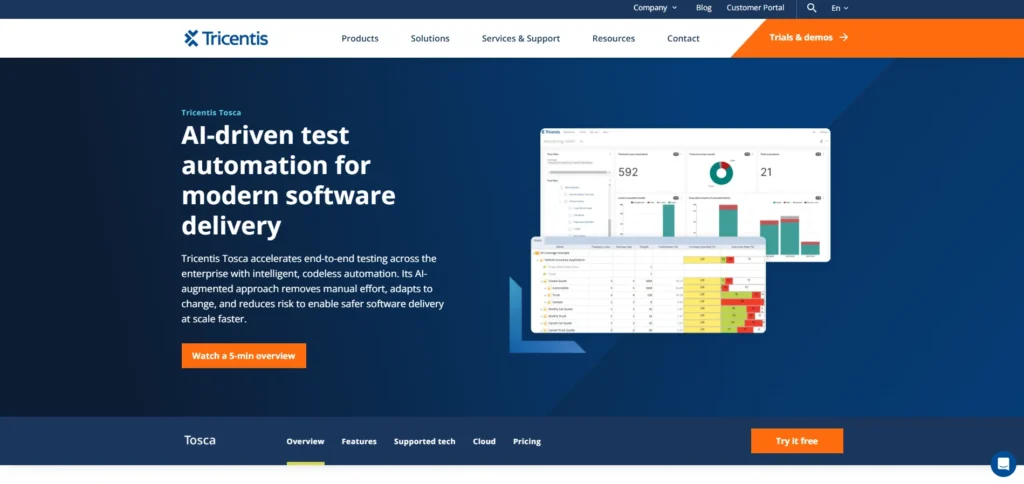
Tricentis Tosca is a model-based enterprise-level test automation platform. It is codeless and can be used to automate web, mobile, API, ERP, and desktop applications, which makes it suitable in a large organisation. Tosca focuses on risk-based testing, whereby the coverage of the test is based on business priorities.
Its drag-and-drop platform enables the non-technical user to build automation processes fast. Tosca is a tool that is integrated with CI/CD systems, allows the virtualisation of services, and lowers the maintenance cost of tests with artificial intelligence capabilities.
Its large-scale capability, compliance capabilities, and wide technology coverage make it a good option, especially in such industries as banking, healthcare, and manufacturing, where precision and efficiency matter.
Website: https://www.tricentis.com/products/automate-continuous-testing-tosca
Key Features:
- Model-based test automation.
- Risk-based testing approach.
- Supports web, mobile, API, ERP, and desktop.
- Drag-and-drop test creation.
- Service virtualization & CI/CD integration.
Pricing:
- Request Pricing
7. ACCELQ
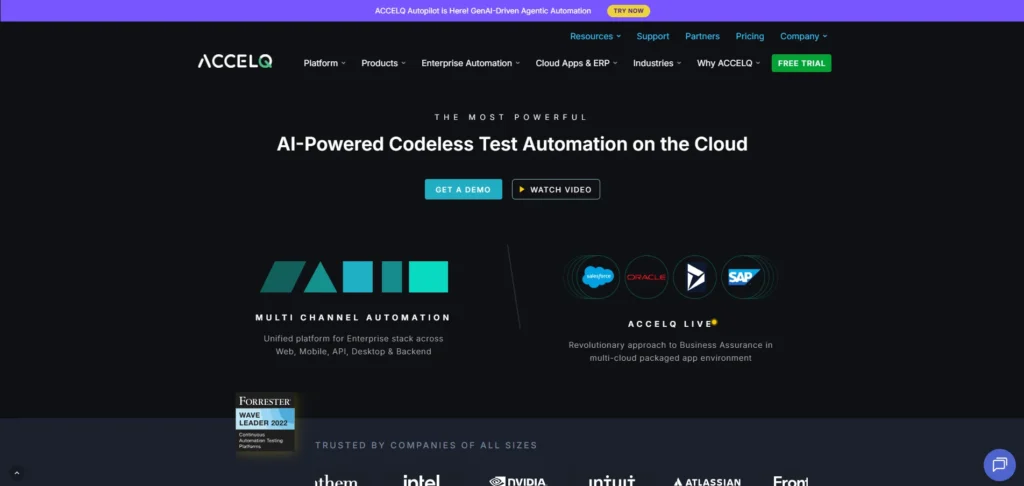
ACCELQ is a cloud-based AI-driven test automation platform offering codeless automation for web, mobile, API, and desktop applications. It emphasises simplicity and speed by providing natural language test creation. ACCELQ’s self-healing capabilities reduce maintenance overhead by adapting to application changes automatically.
It integrates seamlessly with CI/CD pipelines, DevOps tools, and popular test management tools, ensuring smooth collaboration across QA teams. The platform is scalable for enterprise use and offers detailed reporting and analytics to track quality metrics.
By focusing on ease-of-use, AI adoption, and enterprise readiness, ACCELQ helps teams achieve faster release cycles with reduced manual effort.
Website: https://www.accelq.com/
Key Features:
- AI-driven codeless automation.
- Supports web, mobile, API & desktop.
- Self-healing test scripts.
- Integration with DevOps & CI/CD tools.
- Detailed reporting & analytics.
Pricing:
- Request Pricing
8. testRigor
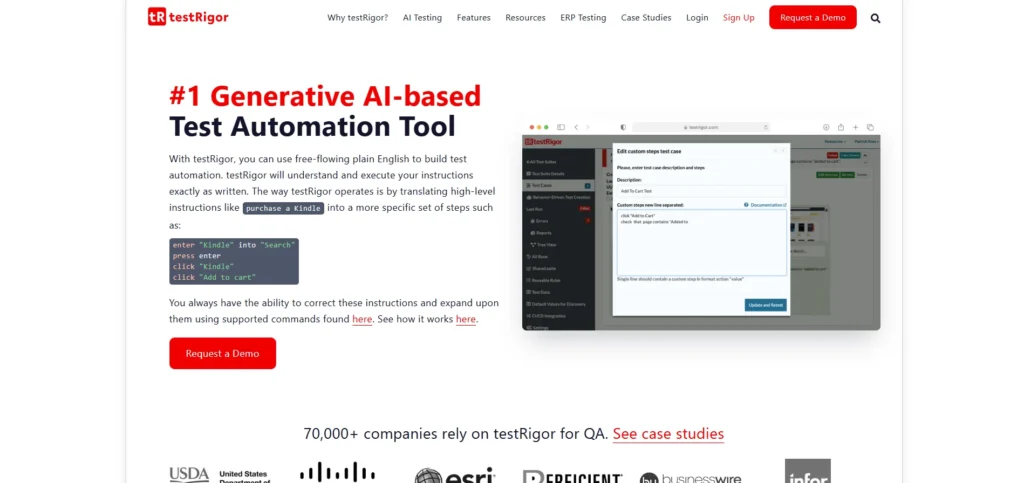
testRigor is an AI-powered solution in the field of automation testing tools, designed to enable plain English test creation without coding. It supports testing for web, mobile, desktop, and APIs, making it versatile for end-to-end testing needs and a great example of AI testing tools intelligent QA with testRigor.
testRigor allows users to write tests in natural language, drastically lowering the technical barrier to entry. Its self-healing technology reduces maintenance costs by automatically adapting tests to UI changes.
With integration into CI/CD pipelines, testRigor aligns well with agile and DevOps workflows. The platform’s simplicity and scalability make it a strong choice for businesses seeking rapid automation adoption across teams.
Website: https://testrigor.com/
Key Features:
- Plain English test case creation.
- Codeless automation across platforms.
- Self-healing tests with AI.
- CI/CD pipeline integration.
- Supports web, mobile, desktop, and APIs.
Pricing:
- Request Pricing
9. Robot Framework
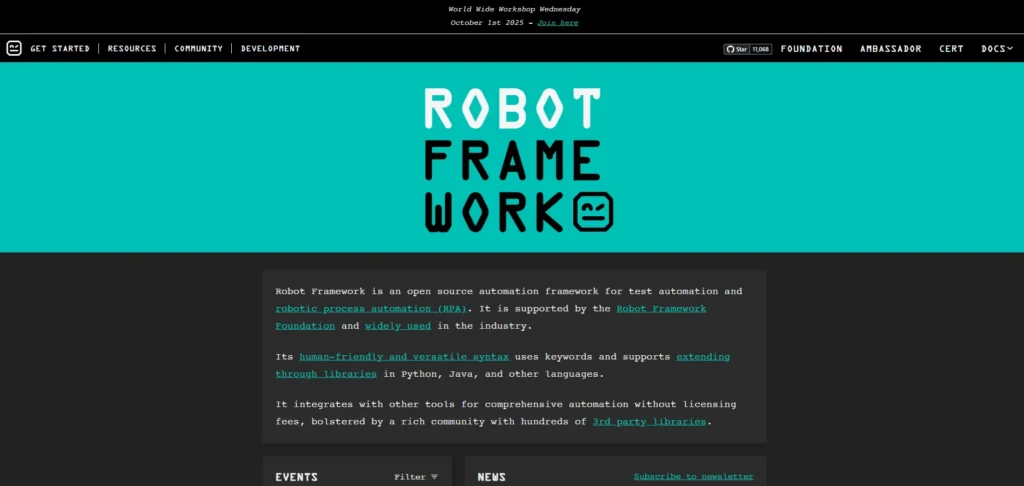
Robot Framework is a popular open-source automation framework that uses a keyword-driven approach. It supports web, API, database, and desktop application testing through a wide range of external libraries and plugins.
Its plain text syntax allows collaboration among testers, developers, and business users. Robot Framework integrates seamlessly with Selenium, Appium, and other automation libraries, enhancing flexibility. Its modular architecture supports scalability and reusability, while reporting capabilities provide clear visibility into test execution.
With a large community and continuous updates, Robot Framework is a reliable option for acceptance testing and RPA (Robotic Process Automation).
Website: https://robotframework.org/
Key Features:
- Keyword-driven test automation.
- Supports web, API, and desktop testing.
- Integrates with Selenium & Appium.
- Extensible with external libraries.
- Strong reporting and reusability features.
10. Nightwatch.js
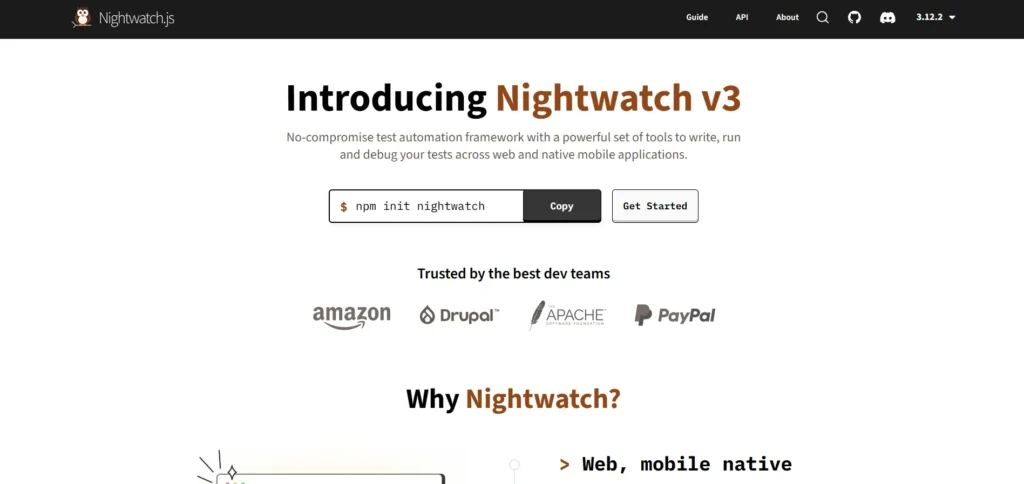
Nightwatch.js is an open-source Node. js-based test automation framework optimised for web and mobile applications. It enables end-to-end testing using the W3C WebDriver protocol and comes with built-in assertions for simplifying test writing.
Its integrated test runner and easy setup make it beginner-friendly. Nightwatch.js supports cross-browser testing, parallel execution, and visual regression checks.
It is highly compatible with CI/CD tools like Jenkins and GitHub Actions, allowing streamlined workflows. The framework’s strong support for JavaScript makes it particularly attractive for full-stack developers working in modern web development environments.
Website: https://nightwatchjs.org/
Key Features:
- Node. js-based automation framework.
- Built-in assertions & easy setup.
- Cross-browser and mobile testing.
- Parallel test execution.
- CI/CD pipeline compatibility.
11. Cucumber
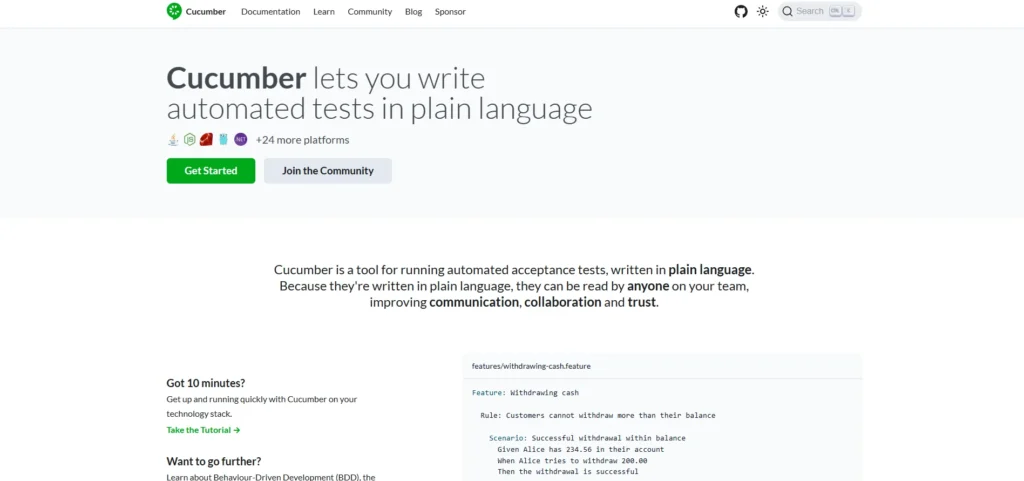
Cucumber is an open-source tool built for Behavior Driven Development (BDD), enabling collaboration between developers, testers, and business stakeholders.
It uses the Gherkin syntax, allowing tests to be written in plain language and understood by non-technical users. Cucumber integrates well with popular test automation frameworks like Selenium and Appium for execution, making it versatile for web and mobile testing.
Its ability to connect requirements with test cases improves traceability and transparency. Widely used in agile environments, Cucumber strengthens communication, ensures business alignment, and simplifies test automation maintenance.
Website: https://cucumber.io/
Key Features:
- Supports Behavior Driven Development (BDD).
- Readable Gherkin syntax for test cases.
- Integrates with Selenium & Appium.
- Improves collaboration between teams.
- Supports web and mobile automation.
12. Ranorex
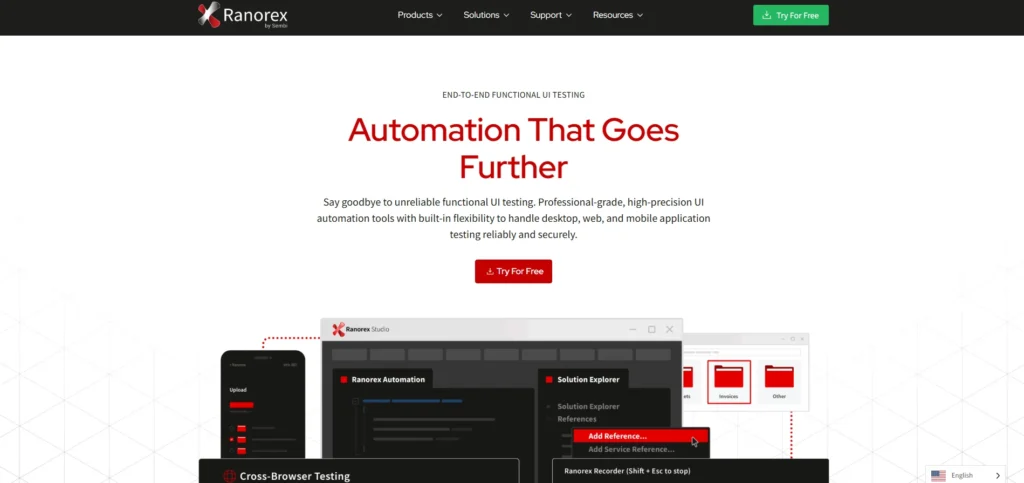
Ranorex is a commercial test automation solution built for desktop, web, and mobile applications. As one of the reliable automation testing tools, it provides both codeless automation with a drag-and-drop recorder and advanced scripting using C# or VB.NET, allowing flexibility for diverse teams.
Ranorex Studio includes robust object recognition, reusable test modules, and cross-browser compatibility, helping reduce maintenance effort. The platform integrates seamlessly with CI/CD pipelines, bug-tracking systems, and version control tools.
Its detailed reporting and test management support make it an enterprise-ready solution. Ranorex is valued for its balance of ease-of-use and powerful customisation, serving QA teams needing scalable, efficient, and reliable test automation.
Website: https://www.ranorex.com/
Key Features:
- Codeless recorder + full scripting in NET.
- Robust object recognition engine.
- Cross-browser and mobile testing support.
- Reusable test modules for maintainability.
- Seamless CI/CD tool integrations.
13. TestComplete
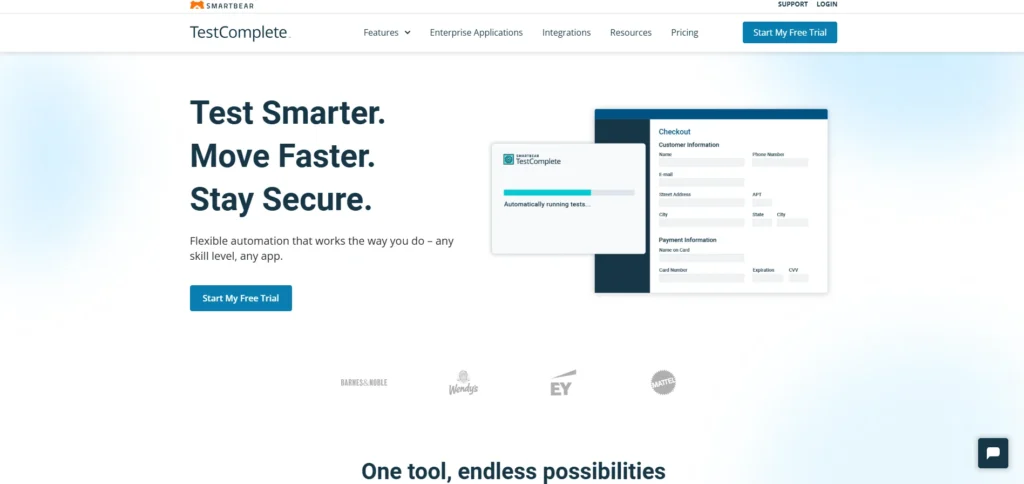
TestComplete by SmartBear is a commercial automation platform for desktop, web, and mobile testing. It offers a scriptless record-and-playback option for beginners alongside advanced scripting support for Python, JavaScript, and VBScript.
TestComplete’s AI-powered object recognition engine ensures test stability against dynamic UI changes, while parallel execution accelerates regression cycles. The platform supports reusable components, detailed debugging, and robust reporting features.
With integrations into Jenkins, Jira, Git, and other CI/CD and DevOps tools, TestComplete fits agile workflows. Its combination of flexibility, scalability, and ease of use makes it a popular choice among enterprises for end-to-end automated testing.
Website: https://smartbear.com/product/testcomplete/
Key Features:
- Scriptless + script-based automation.
- AI-powered object recognition.
- Record-and-playback functionality.
- Parallel execution for faster testing.
- Integrations with CI/CD and DevOps tools.
Pricing:
- TestComplete Base– $8,316
- TestComplete Pro– $7,799
14. LambdaTest
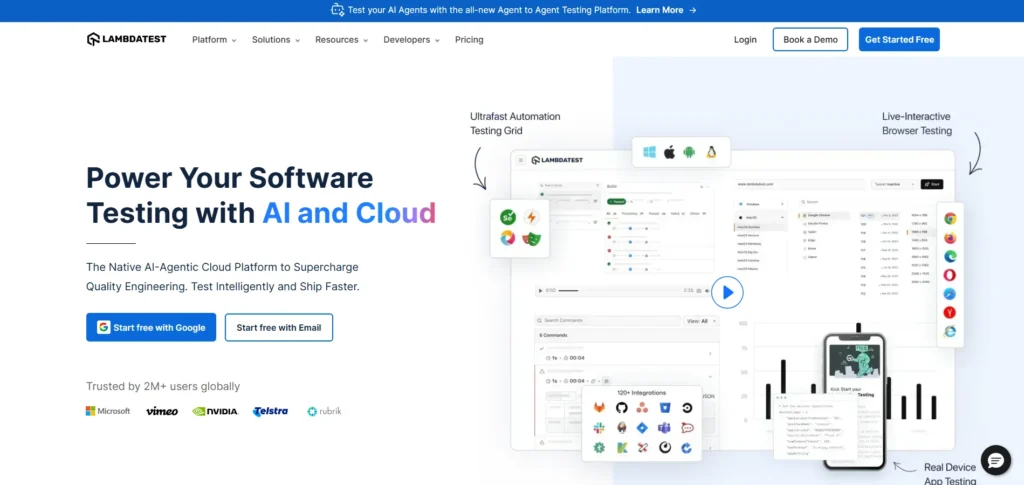
LambdaTest is a cloud-based automation platform designed for cross-browser and cross-device testing at scale. It supports popular frameworks such as Selenium, Cypress, Playwright, and Appium, making it versatile for web and mobile application testing.
LambdaTest provides access to thousands of real browsers, operating systems, and devices, enabling accurate test coverage. With parallel execution, automated screenshots, and smart debugging logs, teams can accelerate release cycles. The platform integrates with major CI/CD pipelines and collaboration tools, supporting agile and DevOps practices.
Affordable, scalable, and accessible, LambdaTest empowers distributed teams to deliver high-quality applications with reliable, cloud-based automation capabilities.
Website: https://www.lambdatest.com/
Key Features:
- Cloud-based cross-browser/device testing.
- Supports Selenium, Cypress, Playwright, and Appium.
- Parallel test execution at scale.
- Access to real devices and OS combinations.
- CI/CD and collaboration tool integrations.
Pricing:
- Desktop Automation Testing – Linux- $39/month
- Web & Mobile Browser on Real Device– $158/month
- Web & Mobile Browser Automation– $119/month
15. BugBug
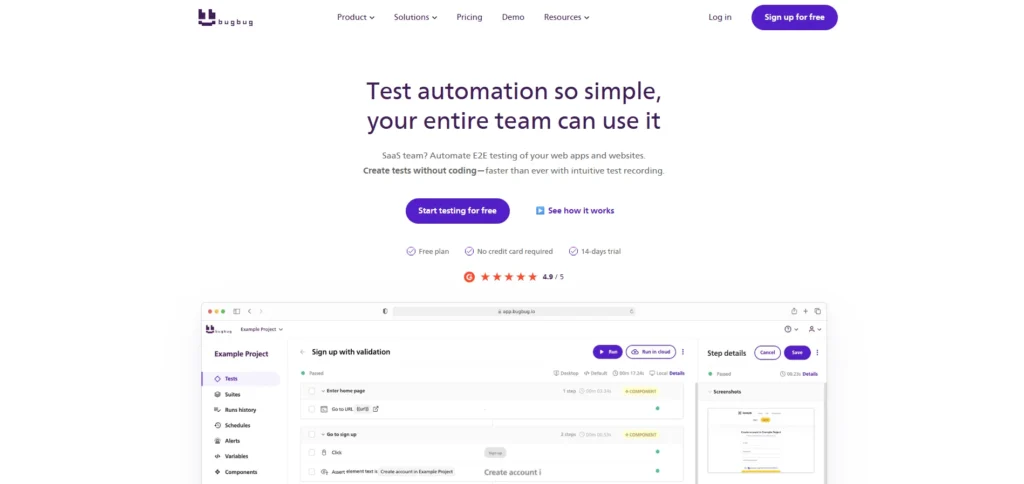
BugBug is a lightweight, codeless test automation tool designed specifically for web applications. It emphasises simplicity with a browser-based interface that requires no additional installations or complex setups.
BugBug allows teams to create, run, and schedule tests quickly, making it ideal for startups and small businesses. As one of the emerging automation testing tools, it offers features like step recording, reusable components, and automatic retries to enhance reliability.
With CI/CD integration and cloud execution options, BugBug supports agile workflows. Its affordability and focus on ease of use make it attractive for teams looking for straightforward web automation without steep learning curves.
Website: https://bugbug.io/
Key Features:
- Codeless browser-based automation.
- Quick test creation & scheduling.
- Reusable steps and components.
- Automatic retries for stability.
- CI/CD and cloud execution support.
Pricing:
- PRO- $119 per month
- BUSINESS- $359 per month
Quick Comparison of Automation Testing Tools
| Name | Pros | Cons |
| Selenium | Extremely flexible with multi-language and multi-browser support, backed by a massive open-source community. | Steeper learning curve and requires more coding expertise compared to codeless platforms. |
| Playwright | Auto-waiting and modern browser support make tests more stable with less flakiness. | Limited ecosystem compared to Selenium, with fewer third-party integrations. |
| Cypress | Fast in-browser execution with time-travel debugging improves developer productivity. | Limited support for multiple tabs and mobile app testing. |
| Appium | True cross-platform mobile automation (Android & iOS) using one test script. | Test execution can be slower due to reliance on the WebDriver architecture. |
| Katalon Platform | Combines codeless testing with advanced scripting for both beginners and experts. | Some advanced features are locked behind paid plans. |
| Tricentis Tosca | Model-based testing reduces maintenance and improves test reusability. | High licensing cost makes it less accessible for small teams. |
| ACCELQ | AI-driven self-healing reduces test maintenance significantly. | Cloud-first approach may not suit organizations with strict on-premises requirements. |
| testRigor | Allows test creation in plain English, lowering the barrier for non-technical users. | May lack granular control for teams needing highly customized test scripts. |
| Robot Framework | Keyword-driven approach with strong library support makes it very extensible. | Reported slower execution speed compared to lightweight frameworks. |
| Nightwatch.js | A simple Node.js setup with built-in assertions is ideal for JavaScript developers. | Less feature-rich compared to Playwright or Cypress. |
| Cucumber | Enables strong collaboration with business stakeholders via Gherkin syntax. | Can lead to verbose test cases, requiring extra effort in maintenance. |
| Ranorex | Strong object recognition for desktop applications and legacy systems. | A Windows-only development environment limits flexibility for cross-platform teams. |
| TestComplete | AI-powered object recognition handles dynamic UIs effectively. | Resource-intensive, requiring powerful machines for smooth execution. |
| LambdaTest | Provides access to thousands of real devices and browsers in the cloud. | Network dependency may slow down tests compared to local execution. |
| BugBug | Extremely easy to set up and run with a browser-only interface. | Focused mainly on web automation, lacking advanced enterprise features. |
Ending Thoughts
Automation testing tools play a vital role in modern software development, ensuring speed, accuracy, and efficiency across web, mobile, API, and enterprise applications.
From open-source frameworks like Selenium, Playwright, and Cypress to enterprise-grade platforms such as Tricentis Tosca, UFT One, and ACCELQ, organisations now have diverse options to match their technical and business needs. Codeless solutions like testRigor and BugBug lower barriers for non-technical users, while developer-focused tools like Nightwatch.js and Cucumber streamline agile collaboration.
Features such as AI-powered self-healing, parallel execution, and CI/CD integration further reduce maintenance overhead. By choosing the right test automation software, businesses can improve release cycles, enhance software quality, and achieve reliable digital transformation at scale.
FAQs
1. What is Automation Testing, and How is it Different from Manual Testing?
Automation testing uses specialised tools to execute test cases automatically, while manual testing requires human effort. Automation is faster, more accurate, and scalable compared to manual testing.
2. Which Types of Tests are Best Suited for Automation?
Repetitive, data-driven, regression, and cross-browser tests are best for automation. Complex scenarios requiring human judgment, usability, and exploratory testing are better handled manually.
3. Are Automation Testing Tools Cost-Effective for Small Businesses or Startups?
Yes, though initial setup requires investment, open-source tools and codeless platforms make automation affordable. Over time, it reduces testing effort, speeds releases, and lowers overall quality assurance costs.
